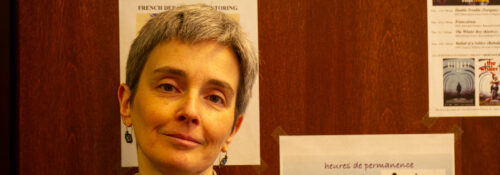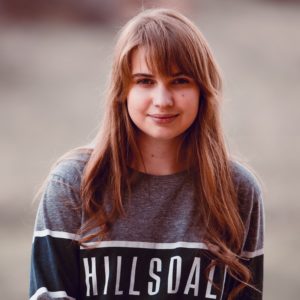
From the USSR to Paris to Hillsdale with Dr. Anna Navrotskaya
Written by Lauren Smith
Professor Anna Navrotskaya entered the U.S. in the mid-1990s as a refugee who didn’t speak a word of English, leaving her friends, work, and school behind in the recently collapsed USSR. From Kent State to Cambridge to Duke to Penn State, Navrotskaya’s voracious appetite for books carried her across the globe on an academic voyage that brought her, at last, to Hillsdale College’s French Department.
Navrotskaya began studying French in her Soviet high school, but when she emigrated to the U.S., government regulations prohibiting the export of printed material forced her to abandon her entire family library. Lacking her textbooks and moving to an English-speaking country, Navrotskaya lost most of her original proficiency. However, once she had mastered English and enrolled in an American university, she faced a foreign language requirement that couldn’t be satisfied by her previous studies. She seized the opportunity and restarted learning French at the beginner level. Soon, she made her first-ever study-abroad trip to France.
When she stepped off the plane, monthly scholarship allowance in hand, she took a preliminary stroll through the Parisian shops. In one bookstore window, a thick volume on French history caught her eye. “The cost,” she told me, chuckling, “was pretty much my monthly allowance.” But to Navrotskaya, a book—filled with stories, with people, with history and culture and society and hundreds of other things to learn about—was worth whatever she had to give. Perhaps, too, she missed the library she had left behind. “So I paid, and then I went home carrying this huge book about Paris.” The director of Navrotskaya’s house asked her what it was and where she’d gotten it, and she responded: “I saw this book, and I really loved it, so I bought it.” And then, ruefully: “But now the next time I eat will be next month!”
Amused, the director told Navrotskaya she wanted to introduce her to one of her friends who, she said, would have done exactly the same thing. That’s how Navrotskaya met Joanne, a native Parisian who became her host during her year in France. Joanne was a painter with an extensive library (good), a fluffy cat (better), and extensive personal connections with some of Paris’s most famous artists, performers, and writers. Staying in her home and following her through restaurants, museums, theaters, and soirées, including hidden gems foreigners couldn’t find without a guide, Navrotskaya became enamored with French culture. “I learned more than I could have ever imagined about Paris,” she told me. “That was one of the best years of my life.” Though Joanne approved of Navrotskaya’s impulse book-buying spree, she introduced her to more thorough texts from her personal library, which Navrotskaya devoured. Old or new, fiction or nonfiction, she left each book with new insight about Paris and its history.
Once the year was up, Navrotskaya returned to the U.S., but she wasn’t ready to abandon study abroad. Joanne’s library had been a wonderful introduction to the world of French literature, and Navrotskaya wanted more. She wasn’t just interested in literature, though—she was interested in its underlying “why.” Why is it important? Why should we study it now? Why is it still relevant today? She began searching for graduate schools where she could pursue a deeper exploration of those questions. Two schools had the perfect program, a combination of philosophy and literature. The catch? Those universities were Oxford and Cambridge, among the most selective in the world.
“I applied just to see. Why not?” Navrotskaya smiled. “I didn’t expect to be accepted, but I was accepted to both.” Because her ambassadorial scholarship only lasted for one year, she chose the philosophy and literature program at Cambridge and packed her bags once more, obtaining her master’s degree in 2003.
Later, when Navrotskaya earned her Ph.D. at Penn State, her dissertation reflected her widely varied studies and cross-discipline interests. “It’s written in French, and it was for the French and francophone studies department, but it’s half performance studies and half philosophy.”
Navrotskaya’s biggest takeaway from her studies is that old literature can teach just as much as modern literature. In her words: “They talk to us, these books. They’re not dead. They’re part of who we are, how we function, how we think, and what we write … We cut them off and exist as if the world was born yesterday. It’s tragic, because we’re losing our own heritage.”
She described how, for most of her teaching career, she was forced to defend her choice to study medieval literature against professors who said it was a useless degree, that she was wasting her time, or that medieval literature is no longer relevant. But something about Hillsdale was different. “I came to Hillsdale, and I saw all these classes in philosophy and literature, and it was marvelous. Absolutely marvelous!” she repeated, laughing. “I could continue studying contemporary theater, which I love, and continue reading my medieval literature that I also love. I don’t have to choose, and I can see how one progresses to another. When I got the offer to teach here, I didn’t even have to think. I decided as soon as I got the phone call that it was a ‘yes.’”
So Navrotskaya boxed up her library and her cats and moved to Hillsdale, settling in the French Department. Last semester, her advanced French class wrote, directed, and performed a French language play set in medieval France, a tribute to the modern relevance of old theater and a chance for her students to advance their French-speaking skills.
Navrotskaya’s parting advice comes as a timely reminder. Learning for its own sake, she says, is more important than learning how to land a career. “Concentrating on what you want to do professionally narrows your worldview and makes it mechanical,” she told me. Her own studies, of course, were anything but mechanical. In her words, they were exactly what learning should be: joyful. “Intellectual joy,” she continued, “is much stronger than physical joy, but you have to develop it. You can’t just go to a piano and start playing. And Hillsdale gives you the freedom not to judge every class you take by whether it’s useful to your future career, [but by its] value in preparing you to be a better human being.” Navrotskaya’s Parisian history book didn’t help her become a high-paid doctor or lawyer or politician, but without it, she might never have met Joanne, and she certainly would have missed out on an experience that shaped the rest of her life. Those are the kinds of intellectual risks she urges students to seek. Doing so, she says, will transform learning from a chore to a passionate search for knowledge that will last a lifetime and open unexpected, captivating doors.
 Lauren Smith, ’25, is a prospective political economy major and French minor. Outside of starting arguments in philosophy class, she enjoys curling up on a bench outdoors (sun, rain, or snow) to write novels or articles for her blog, www.laurensmythbooks.com.
Lauren Smith, ’25, is a prospective political economy major and French minor. Outside of starting arguments in philosophy class, she enjoys curling up on a bench outdoors (sun, rain, or snow) to write novels or articles for her blog, www.laurensmythbooks.com.
Published in February 2022